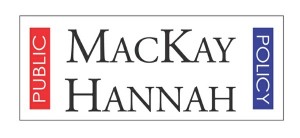Posted by admin on November 3, 2014 ·
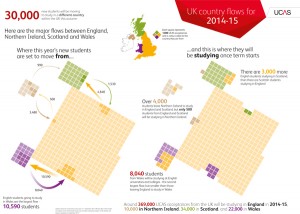
UCAS infographic UK country flows 2014-15
by Helen Thorne, Director of Policy and Research, UCAS. Continuing our guest blog series featuring Informed Scotland subscribers writing on the theme Making connections across the learning & skills landscape.
Almost 1,500 more students started degree courses at Scottish universities this autumn compared to last, as the country continues to attract well qualified students from across Scotland, the rest of the UK and internationally.
UCAS’s interim report on acceptances to full-time undergraduate courses for entry in the 2014/15 academic year shows total recruitment to Scottish universities rising by 4% to 42,000 compared to the 2013/14 entry year. In particular the recruitment of international students increased by 7%.
Within that total the number of Scottish students accepted is up by 2% to 28,500 – the highest level recorded at this point in the admissions cycle.
Our analysis also shows over 4,600 English students chose to study in Scotland, up 11% on last year, plus more than 4,300 from the EU (up 5%) and 3,300 from outside the EU (up 7%), building on a trend of recent increases.
For the first time UCAS has produced an infographic map showing where UK students have chosen to study in different parts of the country. Around 30,000 UK students (about 7% of the total) have chosen to study in a different UK country to the one they live in this year.
While the long-term trend remains for Scots to continue their education in Scotland, nevertheless over 1,500 (5%) began courses in England this year. In contrast, 4,600 (just over 1%) of English students started their studies at Scottish universities. Scottish universities also attracted just under 1,000 students from Northern Ireland.
Elsewhere, some 10,600 students are going to study in Wales with 8,000 travelling the other way across the border.
Amid so many positive indicators, the fact that this year our Daily Clearing Analysis showed that over 55,000 more women than men have been accepted into UK higher education so far should continue to give everyone in the education sector pause for thought. This is a gap that continues to grow across the four countries, with a persistent difference of around 5,000 in Scotland.
With around 98% of acceptances included in these figures, the picture is very close to what we’ll see at the end of the year. The final position will be described in our End of Cycle Report published in December with growth for Scottish universities likely to look healthy, as total UK acceptances to full-time higher education moves towards half a million for the first time.
For further information contact [email protected]
For the latest UCAS analytical releases follow @ucas_analysis on Twitter.
Read our previous guest blogs: Prof Laurie O’Donnell’s Digital creativity and computing in the classroom, SQA’s So what is open education? and UKCES makes connections between disparate ideas.
Posted by admin on October 28, 2014 ·
Informed Scotland is delighted to be supporting two MacKay Hannah conferences examining important themes for learning and skills.
On 9 December we’ll be exhibiting at the Digital & ICT Skills in Scottish Education conference in Linlithgow. The emphasis will be on tackling the digital and ICT skills gap and the sector Skills Investment Plan published earlier this year.
A great line-up includes speakers from the Scottish Government, City of Edinburgh Council, Skills Development Scotland, Oracle, ScotlandIS, e-skills UK, CGI and SCVO.
On 11 December we’ll have a stand at the Poverty & Attainment in Education conference in Edinburgh. The focus will be on closing the attainment gap in schools, with professionals sharing best practice and discussing how to ensure equality in attainment for young people. The programme is packed with influential presenters, including speakers from the Scottish Government, Education Scotland, Scottish College for Educational Leadership, City of Edinburgh Council, Joseph Rowntree Foundation, University of Strathclyde and Barnardo’s Scotland.
We’re working on an Informed Scotland Wider Access, Higher Attainment Special for delegates and subscribers, to highlight the breadth of relevant learning and skills activity across the landscape. More on that later…
Informed Scotland subscribers can buy tickets to attend these conferences at a discount rate. Contact [email protected] to obtain the promotional code or for information about becoming a subscriber.
Follow the conferences on Twitter at #DigiScots14 and #povertyattainment
Posted by admin on October 6, 2014 ·
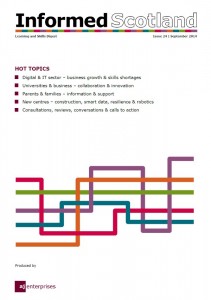
.
As well as the skills shortages, partnerships, action plans, research reports and consultations, September was a month of ‘firsts’:
The General Teaching Council for Scotland accredited a teacher education course run outwith Scotland for the first time – the PGCE top up course at University of Northampton.
The University of the West of Scotland and the Gaiety Theatre established the first partnership Learning Theatre, including a BA in Technical Theatre.
OPITO is organising the first National Oil & Gas Skills Week in November.
University of the Highlands & Islands launched the first crowd funded university Scholarship Fund in Scotland.
And Queen Margaret University, Edinburgh created a ‘world first’ Masters in Dispute Resolution!
A number of surveys and statistical reports normally published in September were absent – presumably caught up in the Referendum ‘hiatus’. It’s to be hoped when organisations catch up, they don’t all publish at once…
Feedback that made us smile this month: ‘The scale and scope of your publication is “awesome”!’ Become an Informed Scotland subscriber to keep on top of all the developments. Email [email protected] to request a sample copy.
Posted by admin on October 1, 2014 ·
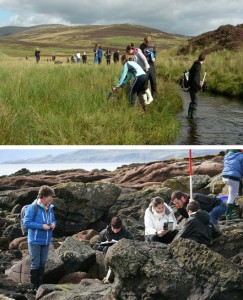
Field Studies Council Scotland
AJ Enterprises is delighted to welcome Field Studies Council Scotland as our latest client – almost certainly the one with the most stunning views!
FSC is an independent environmental education charity and the UK’s leading provider of science, geography and cross-curricular outdoor learning for all ages. FSC runs 18 fieldwork centres across the UK including two in Scotland: FSC Kindrogan, the Scottish Centre for Excellence in Field Studies near Blairgowrie, Perthshire and FSC Millport on the Isle of Cumbrae.
FSC Scotland offers schools and universities a wide range of outdoor learning opportunities with courses meeting curricular and qualification requirements whilst developing personal and teamwork skills and qualities.
In the coming months we’ll be writing a series of blog posts for the FSC Scotland website. With the rich resource of Informed Scotland at our fingertips we’re in a good position to make connections between FSC’s work and the wider learning and skills landscape.
The first article, looking at the connection between achievement & attainment and outdoor learning, was published to coincide with FSC Scotland’s involvement in the annual Scottish Learning Festival.
Posted by admin on September 8, 2014 ·
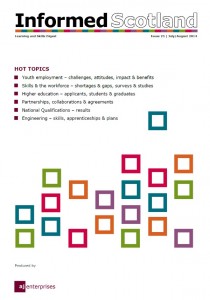
.
Despite many other ‘distractions’ expected to keep learning & skills further down the agenda over the summer, there was no shortage of activity to report. Informed Scotland is packed with research studies, surveys, statistics, new courses, new partnerships and of course exam results.
There are some particularly rich reports to delve into, including those in a section headed ‘Skills and the Workforce’. Look out for Skills Development Scotland’s engineering & advanced manufacturing Skills Investment Plan; UKCES’s skills for sustainable recovery report; The Prince’s Trust’s Skills Crunch survey; CBI/Pearson’s Gateway to Growth report; and SCDI & SDS’s Summer Skills Pulse Survey. Not forgetting the UKCES Scottish Employer Skills Survey, and items from the Youth Skills Commission and Skills for Health.
With the Independence Referendum imminent, a selection of impartial resources and references relevant to learning & skills is provided in an annex to this month’s issue, including those from Education Scotland, FutureLearn, the Royal Society of Edinburgh, YouthLink Scotland and CREID at Edinburgh University.
Email [email protected] to request a sample copy. New subscribers will also receive a copy of our Organisations & People Special issued last month. Once again it has been well received, described as ‘a useful reference point‘, ‘Good to have info in one place’, ‘such a useful directory’, ‘Excellent… packed full of really interesting info.’
Posted by admin on August 22, 2014 ·
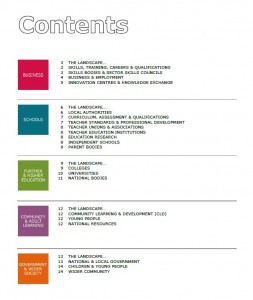
Organisations & People Special 2014
We’ve just published the new Informed Scotland Organisations & People Special ready for the 2014–15 academic session.
It’s a snapshot of the learning & skills landscape, a directory of the key national and local organisations operating across business, education, community & adult learning, government and wider society, including:
- Sector-specific skills bodies
- The eight new Innovation Centres
- Local authority education departments
- Teacher education institutions
- Colleges
- Universities
There have been many changes since the 2013 edition – new organisations, appointments, mergers and movements.
Subscribers received the Special as a bonus, in addition to their regular monthly digests. Last year’s issue was described as ‘extremely useful’, ‘easy to follow’, ‘yet another one stop shop’ and ‘worth the subscription itself’!
All new subscribers will receive a copy – find out how to join the growing list and stay well informed.
Posted by admin on July 6, 2014 ·
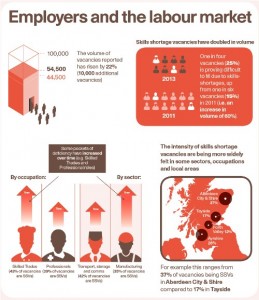
UKCES ESS13 Scotland infographic
On Monday 7th July the UK Commission for Employment & Skills will present its Employer Skills Survey 2013 Scotland findings to an audience in Glasgow. We’ve been waiting to see the detailed picture for Scotland since the UK-wide report of skills gaps and shortages, training investment and recruitment trends was published earlier this year. It was worth the wait!
UKCES senior research manager Genna Kik commented: “It’s great news that job vacancies are up in Scotland, and that employers have the confidence to take on new staff. It is also positive to see that more employees are being trained than two years ago. However rising skills shortages should not be ignored – employers are struggling to fill vacancies in key sectors such as Manufacturing and Business Services and are unable to find suitably skilled staff for Skilled Trades and Professional occupations.
“Employers with skills shortages report substantial challenges, so left unchecked these shortages may have a significant impact on future growth prospects. From today there is a wealth of new data available on employers demand for skills in Scotland just waiting to be explored, it can be used to identify key challenges, opportunities and areas for action – and hopefully avert any future barriers to growth in the process.”
You can read Genna’s blog in full and download an infographic of key findings. The full report is available here. Follow the event and join the debate on Twitter using #ESS13.
Posted by admin on July 4, 2014 ·
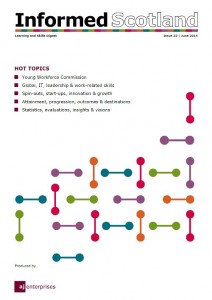
.
As always, June has been a very busy month, full of statistical releases and major research reports published before the holiday season begins.
This year, however, the Wood Commission report has been the main talking point. The final Young Workforce Commission report has received widespread backing and recognition and appears to have generated a momentum for change. As well as the Scottish Government’s ‘full welcome‘, many learning & skills organisations, teacher, business and third sector bodies have issued statements supporting the recommendations. Some have already begun to take action. It’s an accessible, well-written report with a real sense of urgency.
But we don’t begin with a clean sheet of paper… Determined to Succeed, Enterprise in Education, Education for Work & Enterprise, Education Business Partnerships, Teacher Placements, Education Industry Liaison and TVEI – and that’s not all. To make progress, it will be important to reflect and build on the legacy of these and other previous developments.
The next regular issue will be the July/August edition out early in September. However, subscribers will also receive an Organisations & People Special 2014 in August, ready for the new session. Last year’s issue was described as “worth the subscription itself!” by Bright Writing’s Sue Moody.
Become an Informed Scotland subscriber to keep on top of all the developments – and see who’s where in learning & skills in the next Special! Email [email protected] to request a sample copy.
Posted by admin on June 26, 2014 ·
 by Laurie O’Donnell, learning, technology and innovation adviser, consultant and visiting professor. Continuing our guest blog series featuring Informed Scotland subscribers writing on the theme Making connections across the learning & skills landscape.
by Laurie O’Donnell, learning, technology and innovation adviser, consultant and visiting professor. Continuing our guest blog series featuring Informed Scotland subscribers writing on the theme Making connections across the learning & skills landscape.
In the last century I was a secondary computing teacher and saw my role as helping young people to better understand their digital world, supporting them to take the first few steps towards becoming active creators rather than merely passive consumers of other people’s digital products and services.
Over the last six months I have been fortunate to have the opportunity to evaluate a Nesta digital creativity project funded by the Scottish Government to explore models of teacher professional development in schools. For the purposes of the project digital creativity was taken to include computer programming, animation, video production and other activities that involve making rather than consuming digital products.
This project got me back into classrooms and I was really impressed by the enthusiasm of the teachers and the way their students were engaged with a diverse range of digital creativity activities. It was great to see young people develop their computational thinking and begin to understand the decision-making processes behind making a movie; to recognise the painstaking approach to detail required to animate a character; and to understand the precision of instruction necessary to successfully program a webpage.
I was left in no doubt that well designed digital creativity activities in the classroom can provide rich contexts for the development of higher-order skills and help young people to engage as active makers of their increasingly digital world.
All of this got me thinking about the importance, and arguably unique, contribution that computing can make to the school curriculum. After a long period of neglect and decline the last few years has seen the profile of computing in schools being raised. This is at least in part due to the IT and creative industries raising concerns around the difficulties they face in recruiting suitably experienced staff and, quite rightly in my view, lamenting the absence of computing in the curriculum at all levels across the UK (see Nesta’s Next Gen report and Eric Schmidt’s MacTaggart Lecture for example).
The response in England has been prompt with computing now replacing ICT as part of the National Curriculum and the expectation is that programming will be taught to five year-olds – albeit this is likely to be in the form of understanding simple algorithms rather than necessarily coding for all.
In Scotland there are also some very promising developments that have the potential to raise the profile of computing in schools back to its high-point in the early 1990s, and with a bit of luck even higher. These include: PLAN C, a highly innovative approach to developing the pedagogical content knowledge of secondary computing teachers; the beginnings of more relevant computing qualifications from the SQA; the Skills Investment Plan for the ICT & Digital Technologies Sector; and of course the recent publication of the Wood Commission Report on Developing Scotland’s Young Workforce.
Not everyone in school is going to become a computer scientist, but there is something in computing that is fundamental to understanding our world. Something that is not covered anywhere else on the curriculum.
Although much of the current discussion around Curriculum for Excellence is focused on issues of implementation, assessment, resourcing and support it is worth noting the radical change that a 3–18 curriculum was supposed to herald. The formal principles of ‘breadth’, ‘depth’, coherence’ and ‘progression’ that underpinned previous Scottish curricula were extended. The new principles of ‘challenge and enjoyment’, ‘personalisation and choice’ and ‘relevance’ focus on engaging pupils where they are now and where they are going beyond school.
Engaging with the world of the learner is no longer an added extra but an expectation of every teacher’s daily classroom practice. In this respect computing and digital creativity have the potential to provide a rich seam of skills and attributes to help teachers deliver the outcomes and experiences at the heart of Curriculum for Excellence and give all of our young people the best preparation for life in the digital age.
For further information contact [email protected] or follow @laurieod
Read our previous guest blogs: SQA’s So what is open education? and UKCES makes connections between disparate ideas.
Posted by admin on June 9, 2014 ·
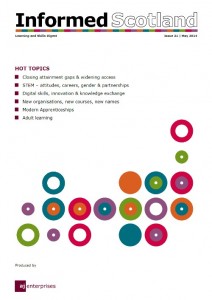
.
The publication of the May 2014 issue of Informed Scotland marks its 2nd birthday.
So what have been some of the biggest changes noted since the first issue?
Two years ago we still had Standard Grade – now the new National Qualifications are a reality for young people, teachers, parents – and employers! In 2012 there were around 40 colleges – now there are 13 college regions, with mergers complete and many new names to grapple with. Two years ago many were only just waking up to the need to develop digital skills for all – now it is a key issue, with business, education, government and the wider community urgently trying to understand and tackle the problem.
Turning to May 2014, the main focus at a national level was on Modern Apprenticeships, highlighted during Scottish Apprenticeship Week. Adult Learners’ Week was at the same time, which was unfortunate as the launch of Adult Learning in Scotland: Statement of Ambition was probably missed by many as apprentices grabbed most of the attention.
The main challenging issue highlighted this month was widening access, with the Scottish Funding Council’s outcome agreements published, and research papers including Eurydice’s Modernisation of Higher Education in Europe.
Also worth looking out for Mondelez International’s snapshot of young people’s attitudes to STEM, with some interesting comparisons between Scotland and the UK as a whole.
This is a great opportunity to publicly thank our subscribers – those who have been with us from the beginning, as well as those more recently signed up. One who just renewed for a further 12 months commented, ‘It was a no brainer renewing our subscription. Informed Scotland is a really useful resource to a good number of us… Keep up the good work!‘
Become an Informed Scotland subscriber to keep on top of all the developments. Email [email protected] to request a sample copy.

